孙子兵法 The Art of War(英汉对照14)
孙子兵法(英汉对照)说课讲解

孙子兵法(英汉对照)个人转载孙子兵法(中英对照)孙子兵法 The Art of War孙武 By Sun TzuTranslated by Lionel Giles始计第一Laying Plans孙子曰:兵者,国之大事,死生之地,存亡之道,不可不察也。
Sun Tzu said: The art of war is of vital importance to the State. It is a matter of life and death, a road either to safety or to ruin. Hence it is a subject of inquiry which can on no account be neglected.故经之以五事,校之以计,而索其情:一曰道,二曰天,三曰地,四曰将,五曰法。
The art of war, then, is governed by five constant factors, to be taken into account in one's deliberations,when seeking to determine the conditions obtaining in the field.These are:(1)The Moral Law;(2)Heaven;(3)Earth;(4)The Commander;(5)Method and discipline.道者,令民于上同意,可与之死,可与之生,而不危也;The Moral Law causes the people to be in complete accord with their ruler, so that they will follow him regardless of their lives, undismayed by any danger.天者,阴阳、寒暑、时制也;Heaven signifies night and day, cold and heat, times and seasons.地者,远近、险易、广狭、死生也;Earth comprises distances,great and small;danger and security;open ground and narrow passes;the chances of life and death.将者,智、信、仁、勇、严也;The Commander stands for the virtues of wisdom, sincerely, benevolence, courage and strictness.法者,曲制、官道、主用也。
孙子兵法 英译汉

2. Choose the right answer to the following questions according to the video. (1)Which beach is one of the most dangerous in France ?( C ) A. Juno B. Sword C. Omaha D. Utah
(2). If you know your enemies and know yourself, you can win a hundred battles without a single loss.( A ) A. A.知彼知己,百战不殆。 B.兵者,诡道也。 C.兵不厌诈。 D.攻其无备,出其不意。
3. Choose the corresponding Chinese quotations from the art of war to the English translation. (1). Attack the enemy where he is unprepared, and appear where you are not expected.( C ) A.利而诱之,乱而取之 B.兵不厌诈。 C.攻其无备,出其不意。 D.不战而屈人之兵,善之善者也。
(2). A great general mentioned in this video is A ____. A. Dwight Eisenhower B. Adolf Hitler C. Winston Churchill D. Joseph Stalin
(3). According to the video, the reason of Hitler's D failure is ____ . A. that he is too proud B. the nature of the war C. his dictatorship D. the way he deployed his panzer tank divisions
孙子兵法原文英文对照版
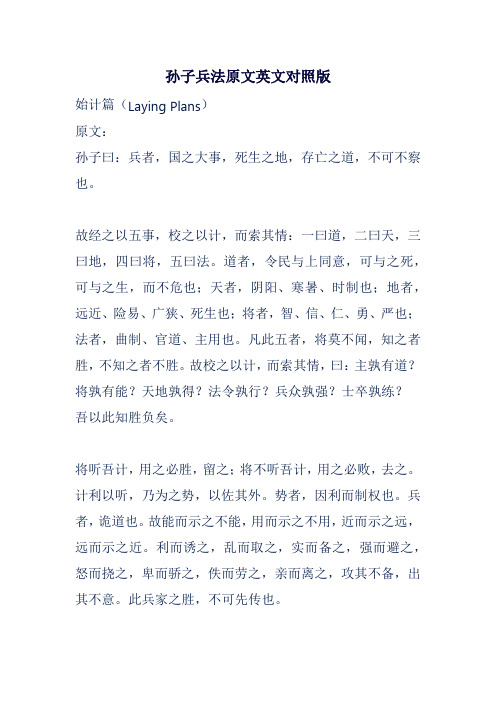
孙子兵法原文英文对照版始计篇(Laying Plans)原文:孙子曰:兵者,国之大事,死生之地,存亡之道,不可不察也。
故经之以五事,校之以计,而索其情:一曰道,二曰天,三曰地,四曰将,五曰法。
道者,令民与上同意,可与之死,可与之生,而不危也;天者,阴阳、寒暑、时制也;地者,远近、险易、广狭、死生也;将者,智、信、仁、勇、严也;法者,曲制、官道、主用也。
凡此五者,将莫不闻,知之者胜,不知之者不胜。
故校之以计,而索其情,曰:主孰有道?将孰有能?天地孰得?法令孰行?兵众孰强?士卒孰练?吾以此知胜负矣。
将听吾计,用之必胜,留之;将不听吾计,用之必败,去之。
计利以听,乃为之势,以佐其外。
势者,因利而制权也。
兵者,诡道也。
故能而示之不能,用而示之不用,近而示之远,远而示之近。
利而诱之,乱而取之,实而备之,强而避之,怒而挠之,卑而骄之,佚而劳之,亲而离之,攻其不备,出其不意。
此兵家之胜,不可先传也。
英文对照(Translated by Lionel Giles)Sun Tzu said: The art of war is of vital importance to the State. It is a matter of life and death, a road either to safety or to ruin. Hence it is a subject of inquiry which can on no account be neglected.The art of war, then, is governed by five constant factors, to be taken into account in one's deliberations, when seeking to determine the conditions obtaining in the field. These are: (1) The Moral Law; (2) Heaven; (3) Earth; (4) The Commander; (5) Method and discipline.The Moral Law causes the people to be in complete accord with their ruler, so that they will follow him regardless of their lives, undismayed by any danger. Heaven signifies night and day, cold and heat, times and seasons. Earth comprises distances, great and small; danger and security; open ground and narrow passes; the chances of life and death. The Commander stands for the virtues of wisdom, sincerely, benevolence, courage and strictness. By method and discipline are to be understood the marshaling of the army in its proper subdivisions, the graduations of rankamong the officers, the maintenance of roads by which supplies may reach the army, and the control of military expenditure.These five heads should be familiar to every general: he who knows them will be victorious; he who knows them not will fail. Therefore, in your deliberations, when seeking to determine the military conditions, let them be made the basis of a comparison, in this wise: (1) Which of the two sovereigns is imbued with the Moral law? (2) Which of the two generals has most ability? (3) With whom lie the advantages derived from Heaven and Earth? (4) On which side is discipline most rigorously enforced? (5) Which army is stronger? (6) On which side are officers and men more highly trained? By means of these seven considerations I can forecast victory or defeat.The general that hearkens to my counsel and acts upon it, will conquer: let such a one be retained in command! The general that hearkens not to my counsel nor acts upon it, will suffer defeat: let such a one be dismissed! While heading the profit of my counsel, avail yourself also of anyhelpful circumstances over and beyond the ordinary rules. According as circumstances are favorable, one should modify one's plans. All warfare is based on deception. Hence, when able to attack, we must seem unable; when using our forces, we must seem inactive; when we are near, we must make the enemy believe we are far away; when far away, we must make him believe we are near.。
翻译TheArtofWarTakesPrecedence
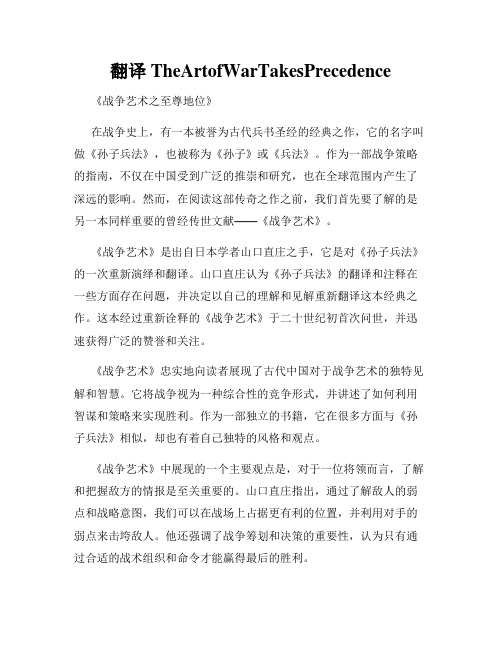
翻译TheArtofWarTakesPrecedence 《战争艺术之至尊地位》在战争史上,有一本被誉为古代兵书圣经的经典之作,它的名字叫做《孙子兵法》,也被称为《孙子》或《兵法》。
作为一部战争策略的指南,不仅在中国受到广泛的推崇和研究,也在全球范围内产生了深远的影响。
然而,在阅读这部传奇之作之前,我们首先要了解的是另一本同样重要的曾经传世文献——《战争艺术》。
《战争艺术》是出自日本学者山口直庄之手,它是对《孙子兵法》的一次重新演绎和翻译。
山口直庄认为《孙子兵法》的翻译和注释在一些方面存在问题,并决定以自己的理解和见解重新翻译这本经典之作。
这本经过重新诠释的《战争艺术》于二十世纪初首次问世,并迅速获得广泛的赞誉和关注。
《战争艺术》忠实地向读者展现了古代中国对于战争艺术的独特见解和智慧。
它将战争视为一种综合性的竞争形式,并讲述了如何利用智谋和策略来实现胜利。
作为一部独立的书籍,它在很多方面与《孙子兵法》相似,却也有着自己独特的风格和观点。
《战争艺术》中展现的一个主要观点是,对于一位将领而言,了解和把握敌方的情报是至关重要的。
山口直庄指出,通过了解敌人的弱点和战略意图,我们可以在战场上占据更有利的位置,并利用对手的弱点来击垮敌人。
他还强调了战争筹划和决策的重要性,认为只有通过合适的战术组织和命令才能赢得最后的胜利。
此外,《战争艺术》还强调了对于战争的审慎态度。
山口直庄认为,战争只应作为最后的手段,任何能够和平解决争端的方法都应该优先考虑。
他主张通过谈判和外交手段解决争端,而不是轻易诉诸于战争。
正因为如此,他认为战争之艺术的根本目标是维护和平,而非单纯追求战争的胜利。
总的来说,《战争艺术》通过对《孙子兵法》的重新诠释,向我们展示了一种全新的战争智慧和理念。
它以清新的视角探索了战争的本质,并试图通过智慧和谋略来解决战争中遇到的各种问题。
这本书也鼓励了读者们在面对战争和争端时,保持冷静和理智,并通过智慧的决策来追求和平。
孙子兵法 评论 英语作文

孙子兵法评论英语作文(中英文实用版)The "Art of War" by Sun Tzu is a timeless masterpiece that transcends the realm of military strategy and permeates into various aspects of life.Its profound wisdom and pragmatic approach continue to captivate readers across the globe.《孙子兵法》是孙武的传世之作,它不仅超越了军事战略的范畴,还渗透到了生活的各个方面。
其深邃的智慧和实践方法,至今仍令全球读者为之着迷。
Each chapter in this ancient text offers unique insights and universal principles that can be applied to both warfare and contemporary situations.Sun Tzu"s emphasis on understanding the enemy and oneself, and the importance of flexibility and adaptability, are particularly relevant in today"s rapidly changing world.这部古文中的每一章节都提供了独特的见解和普遍的原则,这些原则既可以应用于战争,也可以应用于现代情境。
孙武强调了解敌人和自己,以及灵活性和适应性的重要性,这在当今快速变化的世界中显得尤为贴切。
The language of the "Art of War" is concise and elegant, with every word carrying immense weight and significance.It is a testament to the power of brevity and clarity in communication, a skill highly valued in both personal and professional realms.《孙子兵法》的语言简练而优雅,每个字都承载着巨大的重量和意义。
2017考研英语翻译每日一句:《孙子兵法》_毙考题
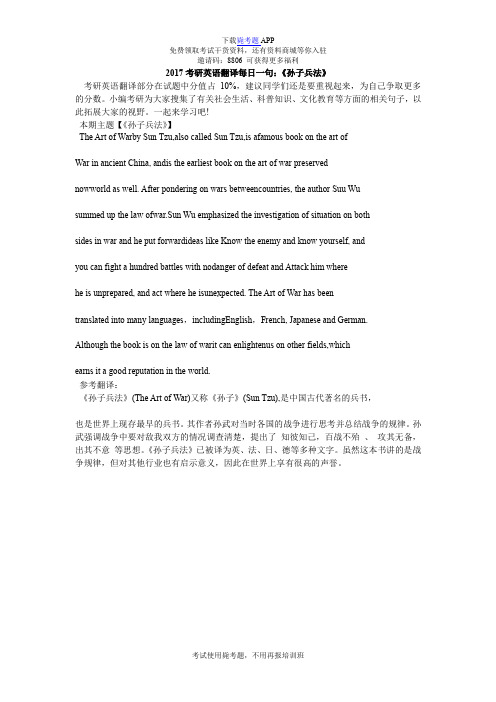
下载毙考题APP免费领取考试干货资料,还有资料商城等你入驻邀请码:8806 可获得更多福利2017考研英语翻译每日一句:《孙子兵法》考研英语翻译部分在试题中分值占10%,建议同学们还是要重视起来,为自己争取更多的分数。
小编考研为大家搜集了有关社会生活、科普知识、文化教育等方面的相关句子,以此拓展大家的视野。
一起来学习吧!本期主题【《孙子兵法》】The Art of Warby Sun Tzu,also called Sun Tzu,is afamous book on the art ofWar in ancient China, andis the earliest book on the art of war preservednowworld as well. After pondering on wars betweencountries, the author Suu Wusummed up the law ofwar.Sun Wu emphasized the investigation of situation on bothsides in war and he put forwardideas like Know the enemy and know yourself, andyou can fight a hundred battles with nodanger of defeat and Attack him wherehe is unprepared, and act where he isunexpected. The Art of War has beentranslated into many languages,includingEnglish,French, Japanese and German.Although the book is on the law of warit can enlightenus on other fields,whichearns it a good reputation in the world.参考翻译:《孙子兵法》(The Art of War)又称《孙子》(Sun Tzu),是中国古代著名的兵书,也是世界上现存最早的兵书。
孙子兵法中英文对照
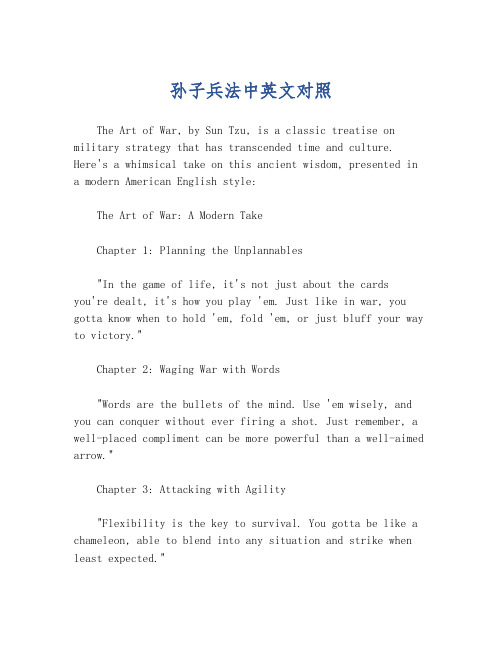
孙子兵法中英文对照The Art of War, by Sun Tzu, is a classic treatise on military strategy that has transcended time and culture.Here's a whimsical take on this ancient wisdom, presented in a modern American English style:The Art of War: A Modern TakeChapter 1: Planning the Unplannables"In the game of life, it's not just about the cardsyou're dealt, it's how you play 'em. Just like in war, you gotta know when to hold 'em, fold 'em, or just bluff your way to victory."Chapter 2: Waging War with Words"Words are the bullets of the mind. Use 'em wisely, and you can conquer without ever firing a shot. Just remember, a well-placed compliment can be more powerful than a well-aimed arrow."Chapter 3: Attacking with Agility"Flexibility is the key to survival. You gotta be like a chameleon, able to blend into any situation and strike when least expected."Chapter 4: The Art of Deception"Keep your enemies guessing, and your friends second-guessing. A little misdirection can make all the difference between a stalemate and a checkmate."Chapter 5: The Power of Position"Location, location, location. It's not just for real estate. Knowing where to stand can mean the differencebetween being the hero or the zero."Chapter 6: The Strategy of Strength"Strength isn't just about muscles or firepower. It's about knowing your strengths and using them to your advantage. Like a superhero with a secret identity, you gotta know whento show your hand."Chapter 7: The Enemy of My Enemy"Make friends with your enemy's enemy, and you might just find yourself with a new ally. It's like the saying goes,'The enemy of my enemy is my friend, unless they're also my enemy.'"Chapter 8: The Calm Before the Storm"Patience is a virtue, especially when you're waiting for the perfect moment to strike. It's like a cat stalking its prey, all stealth and no rush."Chapter 9: The Unseen Hand"Sometimes, the best way to win is to let your opponent think they're winning. It's like a magician's trick – the real magic happens when they're not looking."Chapter 10: The End of the Beginning"Victory is sweet, but it's just the beginning. Remember, the real art of war is not just in winning the battle, but in shaping the peace."So there you have it, a modern take on the ancient wisdom of Sun Tzu, complete with a dash of humor and a pinch of wit. Remember, in the game of life, it's not about how you start, but how you finish. And with a little bit of strategy, you can come out on top every time.。
孙子兵法英译

孙子兵法英译以下是《孙子兵法》中英文对照:孙子曰:兵者,国之大事,死生之地,存亡之道,不可不察也。
Sunzi said: The art of war is the vital concern of the nation, a matter of life and death, the road to survival or ruin; hence it cannot but be carefully studied.故经之以五事,校之以计,而索其情:一曰道,二曰天,三曰地,四曰将、法。
Therefore one must examine the enemy's five factors and compare them with one's own; only then can one achieve a favorable situation. The five factors are: (1) the moral law, (2) the weather, (3) the ground, (4) the commander, and (5) regulation.道者,令民与上同意也,故可以与之死,可以与之生,而不畏危。
Moral law means that the people share the same view with their leader; hence they are ready to follow him in life or death without any fear of danger.天者,阴阳、寒暑、时制也。
As for "heaven," it means the weather - whether cloudy or fine - and the changes of temperature and season.地者,远近、险要、广狭、死生也。
孙子兵法 The Art of War 中英文对照
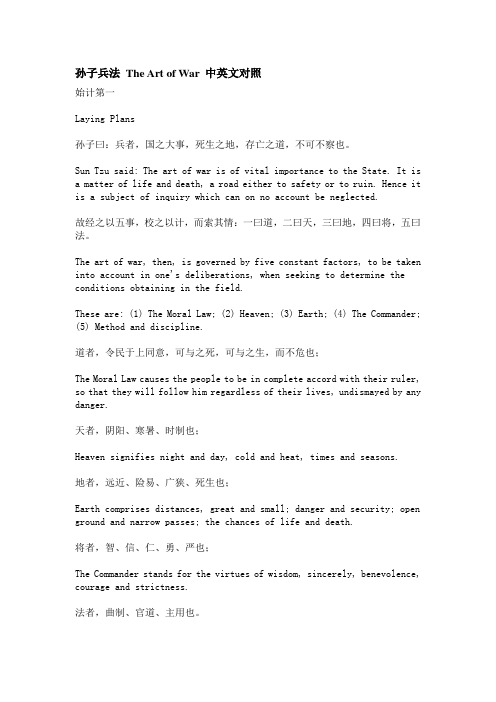
孙子兵法The Art of War 中英文对照始计第一Laying Plans孙子曰:兵者,国之大事,死生之地,存亡之道,不可不察也。
Sun Tzu said: The art of war is of vital importance to the State. It is a matter of life and death, a road either to safety or to ruin. Hence it is a subject of inquiry which can on no account be neglected.故经之以五事,校之以计,而索其情:一曰道,二曰天,三曰地,四曰将,五曰法。
The art of war, then, is governed by five constant factors, to be taken into account in one's deliberations, when seeking to determine the conditions obtaining in the field.These are: (1) The Moral Law; (2) Heaven; (3) Earth; (4) The Commander;(5) Method and discipline.道者,令民于上同意,可与之死,可与之生,而不危也;The Moral Law causes the people to be in complete accord with their ruler, so that they will follow him regardless of their lives, undismayed by any danger.天者,阴阳、寒暑、时制也;Heaven signifies night and day, cold and heat, times and seasons.地者,远近、险易、广狭、死生也;Earth comprises distances, great and small; danger and security; open ground and narrow passes; the chances of life and death.将者,智、信、仁、勇、严也;The Commander stands for the virtues of wisdom, sincerely, benevolence, courage and strictness.法者,曲制、官道、主用也。
孙子兵法 翻译

孙子兵法翻译孙子兵法(The Art of War),是中国古代兵书的经典之作,被誉为世界上最早的兵书之一。
它由春秋末期的军事家孙武所著,全书分为十三篇,包含了中国古代军事思想的核心理论和实践经验。
以下是对《孙子兵法》的翻译。
《孙子兵法》一书主要讲述了战争的基本原则和策略。
其中包括了战争的本质、战争中的各种因素和变化、军队的组织和指挥、军事行动的各个阶段以及取胜的方法等。
它系统地总结了中国古代军事思想,并对战争中的诸多问题进行了全面而深入的分析。
其中,书中提到的战争原则之一是“知彼知己,百战不殆”。
它强调了在战争中对敌方和自己的准确了解的重要性。
只有充分地了解敌方的实力、意图和行动方式,才能做出正确的决策和采取有效的战略。
另一个重要原则是“以计待敌,以静制动”,它强调了在战争中运用智慧和计谋来击败敌人的重要性。
通过善于谋划和抓住敌人的弱点,可以在战争中取得胜利。
此外,书中还提出了一些战争中的具体战略和策略,如“兵不厌诈”的战术,即在战争中常常使用变化多端的策略和伎俩来迷惑敌人,达到出奇制胜的目的;“攻其不备,出其不意”的策略,即乘敌人不备时出其不意地发动攻击,从而取得胜利。
这些战略和策略不仅适用于军事领域,也可以在其他领域中应用,如政治、经济等。
《孙子兵法》的翻译在不同的时期和地域进行过多次。
不同的研究者和翻译家对书中的内容和语言进行了不同程度的删减、补充和解释。
他们通过不同的角度和方法来研究和理解这本兵书,使其更贴近当代读者的需要和理解。
无论是在中国还是在国际上,孙子兵法都被广泛研究和应用,成为了一本经典之作。
总之,孙子兵法是一本具有丰富军事思想和策略的兵书。
它不仅对古代军事的研究和理论有着重要的影响,也为当代军事和管理领域提供了宝贵的参考和借鉴。
通过深入研究和理解《孙子兵法》,我们可以更好地认识战争和军事,提高我们的军事智慧和决策能力,为实现和平与安全做出更大的贡献。
孙子兵法英文译名
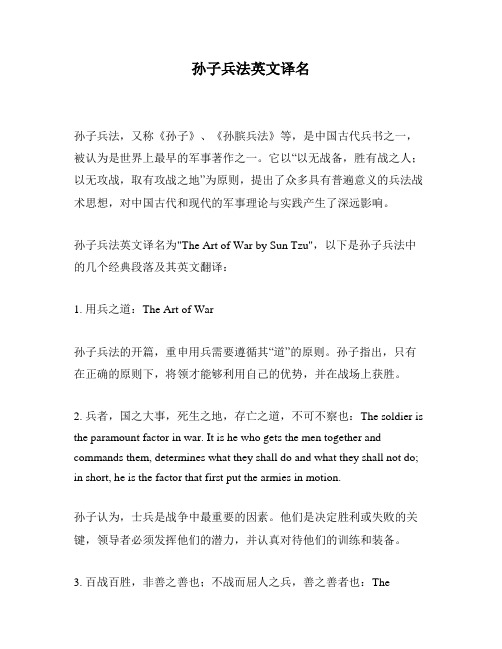
孙子兵法英文译名孙子兵法,又称《孙子》、《孙膑兵法》等,是中国古代兵书之一,被认为是世界上最早的军事著作之一。
它以“以无战备,胜有战之人;以无攻战,取有攻战之地”为原则,提出了众多具有普遍意义的兵法战术思想,对中国古代和现代的军事理论与实践产生了深远影响。
孙子兵法英文译名为"The Art of War by Sun Tzu",以下是孙子兵法中的几个经典段落及其英文翻译:1. 用兵之道:The Art of War孙子兵法的开篇,重申用兵需要遵循其“道”的原则。
孙子指出,只有在正确的原则下,将领才能够利用自己的优势,并在战场上获胜。
2. 兵者,国之大事,死生之地,存亡之道,不可不察也:The soldier is the paramount factor in war. It is he who gets the men together and commands them, determines what they shall do and what they shall not do; in short, he is the factor that first put the armies in motion.孙子认为,士兵是战争中最重要的因素。
他们是决定胜利或失败的关键,领导者必须发挥他们的潜力,并认真对待他们的训练和装备。
3. 百战百胜,非善之善也;不战而屈人之兵,善之善者也:Thesupreme art of war is to subdue the enemy without fighting.孙子认为,战争的最高艺术在于不战而胜。
这不仅可以保护士兵的生命,还可以节省资源和时间。
同时,通过展示强大的军事实力,也可以迫使对手投降。
4. 知己知彼,百战不殆;不知彼而知己,一胜一负;不知彼,不知己,每战必殆:If you know the enemy and know yourself, you need not fearthe result of a hundred battles. If you know yourself but not the enemy, for every victory gained you will also suffer a defeat. If you know neither the enemy nor yourself, you will succumb in every battle.孙子认为,了解对手和自己是成功的关键。
英语作文《孙子兵法》孙武版
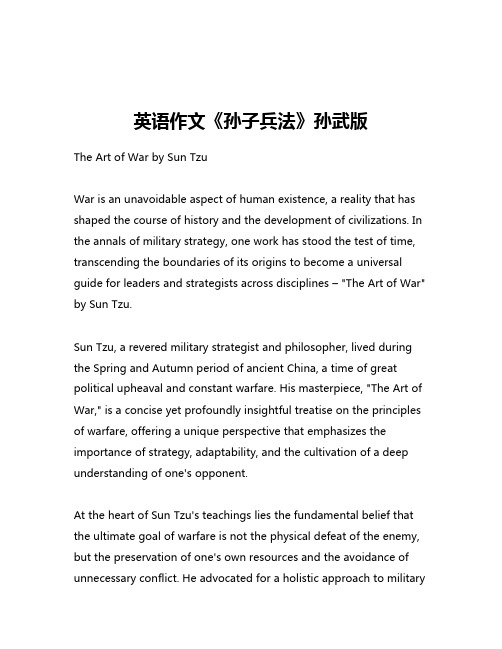
英语作文《孙子兵法》孙武版The Art of War by Sun TzuWar is an unavoidable aspect of human existence, a reality that has shaped the course of history and the development of civilizations. In the annals of military strategy, one work has stood the test of time, transcending the boundaries of its origins to become a universal guide for leaders and strategists across disciplines – "The Art of War" by Sun Tzu.Sun Tzu, a revered military strategist and philosopher, lived during the Spring and Autumn period of ancient China, a time of great political upheaval and constant warfare. His masterpiece, "The Art of War," is a concise yet profoundly insightful treatise on the principles of warfare, offering a unique perspective that emphasizes the importance of strategy, adaptability, and the cultivation of a deep understanding of one's opponent.At the heart of Sun Tzu's teachings lies the fundamental belief that the ultimate goal of warfare is not the physical defeat of the enemy, but the preservation of one's own resources and the avoidance of unnecessary conflict. He advocated for a holistic approach to militarystrategy, one that considers not only the tactical maneuvers on the battlefield but also the social, political, and economic factors that shape the outcome of a conflict.One of the central tenets of Sun Tzu's philosophy is the emphasis on the importance of knowledge and information. He believed that the ability to gather and analyze intelligence about one's adversary was the key to gaining a strategic advantage. By understanding the strengths, weaknesses, and motivations of the enemy, a commander could devise a plan of action that would minimize the risk of direct confrontation and maximize the chances of victory.Another fundamental principle in "The Art of War" is the concept of adaptability. Sun Tzu recognized that the circumstances of warfare were constantly in flux, and that a successful commander must be able to adjust their strategy and tactics to meet the changing conditions on the ground. He emphasized the importance of flexibility, creativity, and the willingness to abandon preconceived notions in the face of new information or unexpected developments.Perhaps one of the most striking aspects of Sun Tzu's teachings is the emphasis on the psychological and emotional aspects of warfare. He understood that the morale and discipline of a military force were just as important as its numerical strength or technological superiority. By cultivating a sense of unity, purpose, and confidenceamong his troops, a commander could effectively demoralize and disrupt the enemy, often without the need for direct confrontation.The enduring relevance of "The Art of War" extends far beyond the realm of military strategy. Its principles and insights have been applied to a wide range of disciplines, from business and politics to personal development and interpersonal relationships. The book's timeless wisdom has inspired leaders, thinkers, and strategists across cultures and eras, demonstrating the universal appeal of Sun Tzu's profound understanding of the human condition and the dynamics of power.In the modern era, where the nature of conflict has evolved and the challenges facing individuals and organizations have become increasingly complex, the teachings of Sun Tzu remain as relevant and valuable as ever. By embracing the principles of strategic thinking, adaptability, and psychological acumen, leaders and decision-makers can navigate the turbulent waters of the 21st century with greater clarity, confidence, and success.As we delve deeper into the wisdom of "The Art of War," we are reminded of the enduring power of knowledge, the importance of a well-crafted strategy, and the transformative potential of a disciplined and focused mind. Sun Tzu's timeless work continues to inspire and guide us, reminding us that the true essence of victorylies not in the brute force of arms, but in the mastery of the self and the understanding of the adversary.。
《孙子兵法:汉英对照TheArtofWar》

《孙子兵法:汉英对照TheArtofWar》孙武孙子兵法《孙子兵法:汉英对照 The Art of War》前言《孙子兵法》是中国古典军事文化遗产中的璀璨瑰宝,是中国优秀文化传统的重要组成部分。
其内容博大精深,思想精邃富赡,逻辑缜密严谨。
作者为春秋时期伟大军事家孙武,大约成书于春秋末年。
该书自问世以来,对中国古代军事学术的发展产生了巨大而深远的影响,被人们尊奉为“兵经”、“百世谈兵之祖”。
历代兵学家、军事家无不从中汲取养料,用于指导战争实践和发展军事理论。
三国时著名的政治家、军事家曹操第一个为《孙子兵法》作了系统的注解,为后人研究运用《孙子兵法》打开了方便之门。
《孙子兵法》不仅是中国的谋略保库,在世界上也久负盛名。
8世纪传入日本,18世纪传入欧洲。
现今已翻译成29种文字,在世界上广为流传。
英国著名军事理论家利德尔.哈特向人透露:他的军事著作中所阐述的观点,其实在2500年前的《孙子兵法》中就可以找到。
他也确实对孙武及其著作深感兴趣,不仅为《孙子兵法》英译本作序,还在自己的得意之作《战略论》前面大段引述孙武的格言。
1991年的海湾战争中,美国海军陆战队军官都奉命携带一本《孙子兵法》,以便在战场上阅读。
《孙子兵法》历代都有著录。
1972年4月山东省临沂县银雀山汉墓出土的竹书《孙子兵法》为迄今最早的传世本,可惜为残简,不能窥其全貌。
现存重要的版本为南宋宁宗时所刻《十一家注孙子》,宋刻与宋抄《武经七书》本,其中宋本《十一家注孙子》经清代孙星衍校定考辩后,成了近世流传最广,影响最大,最敷实用的读本。
本电子版《孙子兵法》根据袁闾琨、张文才主编,辽宁人民出版社2000年1月出版的《中国兵书十大名典·孙子》扫校(辽版社《孙子》选用的是中华书局1961年出版的影印宋本《十一家注孙子》)。
计篇孙子曰:兵者,国之大事,死生之地,存亡之道,不可不察也。
故经之以五事,校之以计而索其情:一曰道,二曰天,三曰地,四曰将,五曰法。
孙子兵法英汉对照

个人转载孙子兵法(中英对照)孙子兵法The Art of War孙武By Sun TzuTranslated by Lionel Giles始计第一Laying Plans孙子曰:兵者,国之大事,死生之地,存亡之道,不可不察也。
Sun Tzu said:The art of war is of vital importance to the State. It is a matter of life and death,a road either to safety or to ruin. Hence it is a subject of inquiry which can on no account be neglected.故经之以五事,校之以计,而索其情:一曰道,二曰天,三曰地,四曰将,五曰法。
The art of war,then,is governed by five constant factors,to be taken into account in one's deliberations,when seeking to determine the conditions obtaining in the field.These are:(1)The Moral Law;(2)Heaven;(3)Earth;(4)The Commander;(5)Method and discipline.道者,令民于上同意,可与之死,可与之生,而不危也;The Moral Law causes the people to be in complete accord with their ruler,so that they will follow him regardless of their lives,undismayed by any danger.天者,阴阳、寒暑、时制也;Heaven signifies night and day,cold and heat,times and seasons.地者,远近、险易、广狭、死生也;Earth comprises distances,great and small;danger and security;open ground and narrow passes;the chances of life and death.将者,智、信、仁、勇、严也;The Commander stands for the virtues of wisdom,sincerely,benevolence,courage and strictness.法者,曲制、官道、主用也。
- 1、下载文档前请自行甄别文档内容的完整性,平台不提供额外的编辑、内容补充、找答案等附加服务。
- 2、"仅部分预览"的文档,不可在线预览部分如存在完整性等问题,可反馈申请退款(可完整预览的文档不适用该条件!)。
- 3、如文档侵犯您的权益,请联系客服反馈,我们会尽快为您处理(人工客服工作时间:9:00-18:30)。
孙子兵法The Art of War(英汉对照14)故形兵之极,至于无形。
无形则深间不能窥,智者不能谋。
In making tactical dispositions, the highest pitch you can attain is to conceal them; conceal your dispositions, and you will be safe from the prying of the subtlest spies, from the machinations of the wisest brains.
因形而措胜于众,众不能知。
How victory may be produced for them out of the enemy’s own tactics--that is what the multitude cannot comprehend.
人皆知我所以胜之形,而莫知吾所以制胜之形。
All men can see the tactics whereby I conquer, but what none can see is the strategy out of which victory is evolved.
故其战胜不复,而应形于无穷。
Do not repeat the tactics which have gained you one victory, but let your methods be regulated by the infinite variety of circumstances.
夫兵形象水,水之行避高而趋下,
Military tactics are like unto water; for water in its natural course runs away from high places and hastens downwards.
兵之形避实而击虚;
So in war, the way is to avoid what is strong and to strike at what is weak.
水因地而制流,兵因敌而制胜。
Water shapes its course according to the nature of the ground over
which it flows; the soldier works out his victory in relation to the foe whom he is facing.
故兵无常势,水无常形。
Therefore, just as water retains no constant shape, so in warfare there are no constant conditions.
能因敌变化而取胜者,谓之神。
He who can modify his tactics in relation to his opponent and thereby succeed in winning, may be called a heaven-born captain.
故五行无常胜,四时无常位,日有短长,月有死生。
The five elements (water, fire, wood, metal, earth) are not always equally predominant; the four seasons make way for each other in turn. There are short days and long; the moon has its periods of waning and waxing.。
